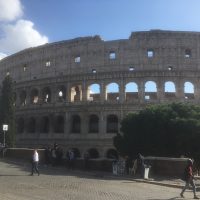Sermon given at St. Andrew’s, Ealing, 17th March 2019 by Revd Sue McCoan
Philippians 3:17 – 4:1
Luke 13:31-35
Jesus, as you know, spent the bulk of his teaching and healing ministry in the region of Galilee, where he was brought up. Galilee is in the north of the country, and it’s a much greener, softer landscape than the hill country further south. But then came the moment, after the transfiguration which we looked at a couple of weeks ago, when Jesus knew that if he was to fulfil his mission, he had to confront the powers of the world, and to do that he had to go to Jerusalem.
Jerusalem is so much more than a place. It is the capital city, the holy city, the city of David – established as the capital by King David himself, where he built his palace, where he brought the ark of the covenant, where Solomon built the Temple to house the Ark. Jerusalem embodied the presence of God, and the heart of the nation. Small wonder, then, that when other countries had invaded, Jerusalem was the place to capture; and when the Romans took control, the place where they set up their local power base. The barracks that housed Roman soldiers was built right next to the Temple Mount. Jerusalem is the centre of secular as well as religious power.
So Jesus sets off towards Jerusalem, with his twelve disciples. Several times on the way, Jesus speaks to them about what will happen, about his arrest and death; the disciples don’t seem able to take it in, but maybe part of the reason for saying it out loud is for Jesus to face the idea himself, to summon his own courage. He is moving, like Maria in the Sound of Music, from the relatively sheltered life of Galilee, to something unknown and quite possibly terrifying.
This is the view you get of Jerusalem, coming down the Mount of Olives. This is essentially what Jesus would have seen when he finally approached the city, except there’d be no skyscrapers and where the Dome of the Rock mosque is would have been the Temple. Look at that eastern wall, running the whole length of the Old City – a full kilometre. There’s a church half way down the Mount of Olives, thought to be the spot where Jesus looked out and wept over Jerusalem. From that spot, you’re about eye-level with this wall. As you look, it stretches wider than your field of vision.
Imagine seeing that for the first time. This is the ‘oh help’ moment.
Seeing this symbol of power, knowing what that power would do to him, Jesus might well have turned and fled. And in our reading today, he is given a very good reason to do just that. The Pharisees, of all people, come to warn him that Herod is out to kill him. Get out, while the going’s good. There is ample opportunity to escape; Jesus had friends in the area; he could surely have found someone to offer him refuge, get him away to safety. But Jesus is not afraid of Herod. Go back to ‘that fox’ and tell him this: I’m going to Jerusalem no matter what. ‘It is unthinkable for a prophet to meet his death anywhere else’.
He presses on. Far from being intimidated, Jesus reacts to the city with compassion. He is really sad that this Jerusalem, once so holy and beautiful holy, is now ruined by corruption and hostility. How often, he says, have I longed to gather your children to me as a hen gathers her chicks under her wings’. What a wonderful image of caring and tenderness, offered so freely, flung back in his face by city hardened by hatred.
I find it astonishing that Jesus can be quite so generous in his attitude towards the place where he will suffer and die; that he can keep walking towards it, despite what it represents. What gives Jesus his confidence, his courage, his commitment?
I suggest it is his very clear sense of who he is, and who he belongs to. He heard the words from God at his baptism, ‘You are my beloved Son; in you I delight’. Then, at the Transfiguration, he heard the voice again, ‘This is my Son, my Chosen; listen to him’. Jesus has affirmation direct from God that he is the chosen one, and therefore that he has to go through with this; and also that God is on control of the situation and therefore he is not going it alone. Yes, the earthly powers will do their worst, they will destroy his body – he already knows that – but they will not defeat his soul, they will not defeat God. Jesus answers to a higher authority than Herod or the Pharisees.
The writer to the Philippians, in our second reading, describes this as being a ‘citizen of heaven’. There’s probably a reference here to being a Roman citizen, who had a certain status, a certain authority, regardless of whereabouts they were in the Roman empire. As citizens of heaven, we and Jesus owe our allegiance to God, and have status within God’s eyes that does not depend on our status or position in this world.
So we can be afraid, but we need never be put off.
We don’t have to face what Jesus faced in Jerusalem. Most of us, thank God, will not have to face persecution for our faith. But many of us may have, at some point in our lives, the ‘oh help’ moment. The new job; the new responsibility; the difficult decision; the prospect of our own mortality, or that of someone we love.
Yesterday morning, I heard the news that an old friend of ours, who had been frail for some time, had died. Later, at synod, I learnt that St Andrew’s Iver, which was the church that nurtured my faith and supported me through lay preaching and my call to ordained ministry, is going to close next month. You may remember in November I used as a sermon illustration a day out with some friends on a canal boat, where we’d been caught out by the clocks changing and had to get home in the dark. We heard, just before Christmas, that the wife had been diagnosed with pancreatic cancer and had months, possibly weeks to live. We visited them on Friday. She is still here, well enough to chat and eat and enjoy company; they talked about the work they are having done on the boat and what a difference it will make. They knew, and we knew, that Carol might not live to see it – but she might. She is a tough person. And so they are dealing, not just with the pain and disruption of illness, not just with the prospect of death, but also with the even harder task of living the life they still have while they still have it. They are facing their big wall, and they are walking on through the fear.
We never know what life will throw at us. We’re probably as well not knowing, most of the time. We too need to find the confidence to keep going, to walk towards the difficulty, to keep living even in the face of dying.
We find our confidence from the same place that Jesus did: from knowing our place in God. Just as we don’t face the same trials that Jesus did, so we don’t necessarily get the direct affirmation, the voice of God speaking personally to us. But we have God’s word in the Bible; we have God’s word in Jesus. We can know, as surely as he did, that we belong to God, that we are the beloved children of God, and that God has our lives in his hands.
At a time of national uncertainty, and international concern, this is the hope to which we cling, the promise in which we trust. This is our God, unchanging and unflinching, in whom we have all the confidence we need.
Amen.




